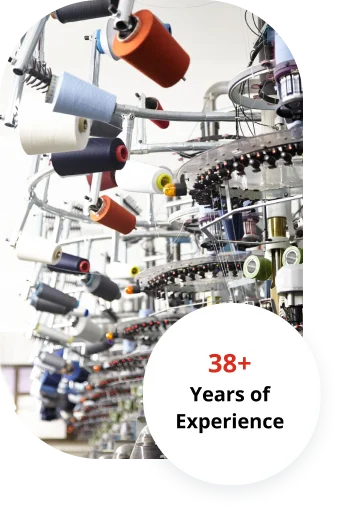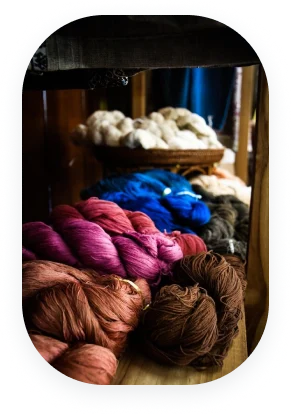
Lighthouse ERP
Knitting & Dyeing Industry
Simple to Use
Easy to Implement
Flexible to Customized Solution

The textile business has specific requirements of cratering to seasonal demands, precise order completion dates, processing capacity management, and process variability due to several operating parameters (heat, moister, material quality).
There is also a shift in smart manufacturing where IT has led the automation of designs and exact process planning.
Knitting and dyeing involves myriads of operations. The knitted fabric undergoes a plethora of chemical processes and treatments like bleaching, dyeing, softener padding, and sourcing. Various parameters affect the quality of fabric. The processes mentioned above make a lot of impact on quality of fabric also before dyeing must be tenuous. After knitting, the dyeing process is initiated. jets and winch machines are used for dyeing. Fabrics after dyeing are processed and delivered in tubular form on becks.
ERP software for knitting and dyeing has an important role in maintaining smooth workflow. Automation and BI helps in industry to gain insights and reports that can lead to strategic decision-making. Various ERP modules in ERP software for knitting and dyeing communicate with each other to form a seamless network for communication and exchange of information. To make workflow smoother, the ERP software stores the information and data centrally. The centrally located data eliminates the delays that occur due to geographical conditions and information can be fetched at any instance.
Whether you are into the knitting, knit dyeing, finishing or processing segments or all of it, Lighthouse ERP can help in running operations smoothly.
Lighthouse ERP for knitting and Dyeing Industry is designed to handle complete needs in the most efficient, effective and accurate way. Lighthouse ERP has continuously evolved since 1987 and Lighthouse Info system is committed to provide an industry-specific ERP module, comprehensive and robust solution for the textile industry. Lighthouse technical expertise and mapping of key requirements is the key behind its success.

Textile units face challenges managing multiple knitting and dyeing orders with different shade cards and delivery timelines. This often leads to rework, delays, and shade mismatches without discrete ERP software.
Interlinked processes like balancing, dyeing, and compacting require precise coordination. Any delay or manual error in process flow affects fabric consistency and production efficiency.
Without lot-wise tracking, tracing defects or isolating faulty rolls becomes time-consuming in bulk textile production. Lack of traceability tools like quality management modules affects dyeing operations.
Paper-based logs for machine downtime result in limited visibility and poor data accuracy. This affects decision-making in production planning and machine performance analysis.
Unstructured naming and variant logic cause duplicate entries, making it hard to track real inventory and demand accurately.
Lighthouse ERP for textile integrates lab dip approvals directly with job cards, minimizing colour mismatches. This ensures right first-time dyeing with pre-approved shade parameters.
With multi-level BOM, the ERP software maps raw to semi-finished to finished goods stage-wise. This structured recipe management improves material planning and production flow.
ERP for the dyeing industry assigns unique lot IDs, enabling quick defect tracing and rollback actions. Root cause analysis tools ensure better quality control and accountability.
Lighthouse ERP system captures real-time data from dyeing machines and knitting lines. This end-to-end production tracking boosts process visibility and on-time delivery.
ERP for knitting and dyeing centrally manages fabric details, GSM, colors, finishes, and SKUsauto-generating item codes and tracking all variants under a unified system.
Track fabric movement through barcodes across all stages from raw material inward, batching, dyeing, and inspection to final packing by lot, roll number, shade, and lab dip reference.
Create order-wise monthly production plans with machine allocation, batch scheduling, process routing, and job card generation for in-house and job-work orders.
Manage all production stages greige inspection, bleaching, dyeing, compacting, and reprocessing using barcode-linked operations and quality benchmarks for each batch.
Monitor each production order through real-time dashboards that show stage-wise progress, expected timelines, and pending operations.
Capture lab dip approvals, shade matching, dye composition, and batch-wise quality parameters, with integration of ISO-based item attributes and customer-specific requirements.
Handle inward/outward movements, inter-yard transfers, returns, and stock positions across stores, weighbridge, quality labs, and security gates centrally managed via ERP.
Control division-wise finances with automated purchase/service bill passing, subcontracting cost tracking, and multi-level stock MIS for detailed profitability and variance analysis.
Auto-generate item codes and BOMs for raw materials, semi-finished, and finished goods with variant management based on fabric attributes and production needs.
Manage pre- and post-shipment processes including LC tracking, consignment sales, export packing, and e-invoicing linked with delivery orders and weighslips.
Digitally track sample requests, shade variations, client approvals, and post-clearance lab dip changes with seamless linkages to production and planning modules.